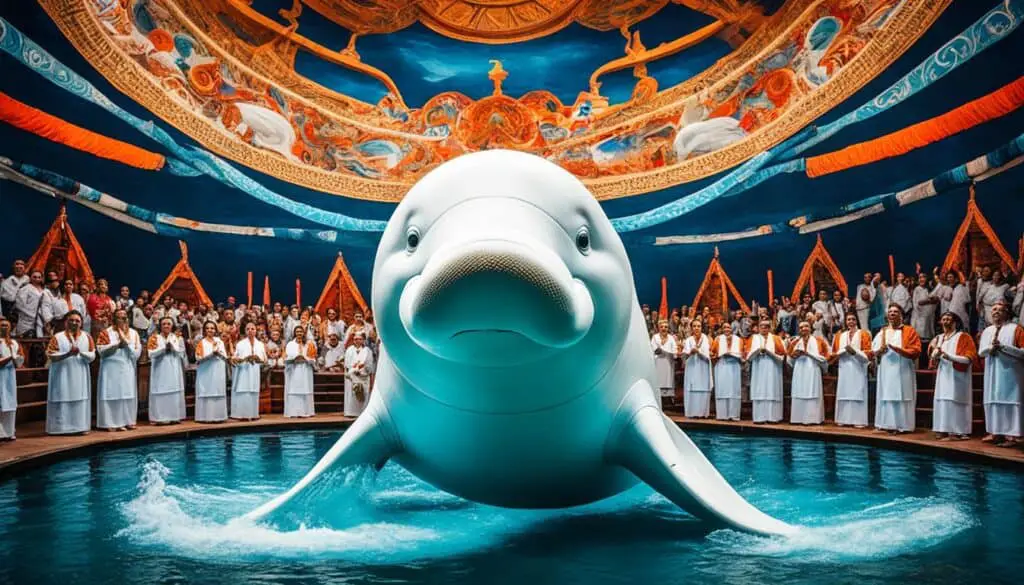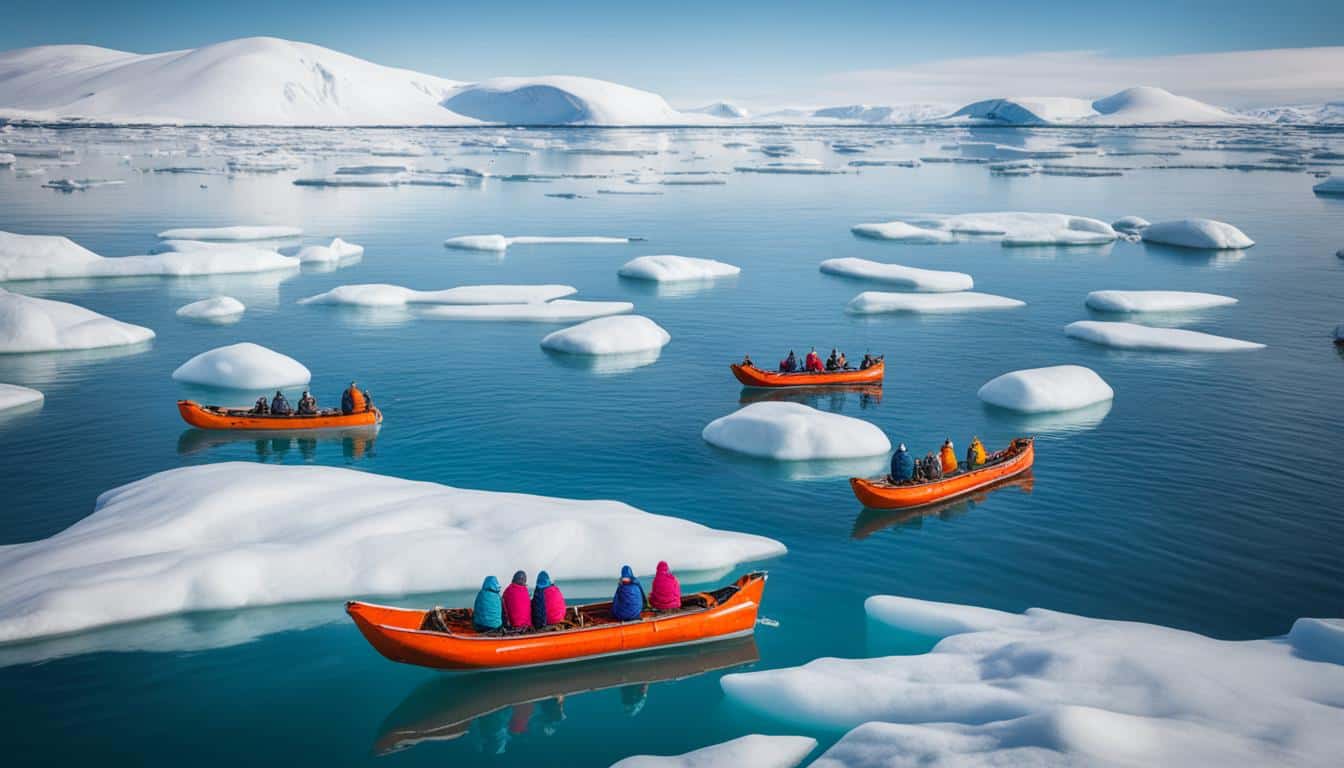Beluga whales are known as the “canaries of the sea” because of their unique sounds. But what makes them culturally important? They mean a lot more than just sea creatures to Arctic communities. They connect Indigenous peoples deeply with their surroundings.
Beluga whales play a big role in these cultures. They are a key part of the community’s food, help build social ties, and have spiritual significance. As their homes are threatened by climate change, it’s crucial to understand their value. This understanding helps us push for sustainable actions and conservation efforts.
Beluga Whales as Symbols of the Arctic
Beluga whales are key symbols of the Arctic. They show the deep bond between Indigenous peoples and their lands and seas. These whales are crucial to Arctic marine life. They help us understand the health of their waters.
Belugas are more than just animals; they hold deep cultural value. They symbolize both beauty and the fragility of their homes. This highlights the dangers humans pose to their habitats. Despite their ability to live in harsh conditions, they face threats from climate change.
Belugas remind us of the importance of protecting the Arctic. They live in icy waters, showing the balance in ocean ecosystems. Learning about their cultural stories helps us value the Arctic’s marine life more.
The Role of Beluga Whales in Indigenous Communities
Beluga whales are very important in the culture of many Indigenous communities. They help shape who these communities are and play a big role in their food and social life. For groups like the Inuvialuit, belugas have always been a key source of food, bringing people together and building strong bonds.
Indigenous communities and belugas have a deep connection through hunting, conservation, and sharing. This connection shows a deep respect for all living things. By combining traditional knowledge with modern science, these communities work together to protect belugas and their homes.
Many Indigenous groups see themselves as guardians of the environment. They hunt belugas in a way that respects their importance. Celebrations and rituals often happen during the whales’ migrations, linking people to their past and strengthening community ties. Seeing how belugas affect Indigenous cultures shows their deep impact.
| Aspect | Indigenous Communities | Beluga Whale Significance |
|---|---|---|
| Food Source | Essential for nutrition | Provides sustenance and food security |
| Cultural Practices | Seasonal migrations celebrated | Integral to rituals and community identity |
| Conservation Efforts | Blend of traditional knowledge and modern science | Ensures sustainable management for future generations |
What is the cultural significance of beluga whales?
Beluga whales are very important to many Arctic communities. They connect with their history, traditions, and daily life. These whales are not just a food source. They also link people to cultural practices that have lasted for generations.
Food Source and Nutritional Value
Beluga whales are crucial for many Indigenous communities. Their meat is full of protein, and their blubber is packed with fats. These fats are key for survival in the Arctic. Belugas help provide food and connect people to their heritage through shared meals.
Cultural Practices and Traditions Around Belugas
Many traditions revolve around belugas, showing respect and thanks for these animals. Hunting them is a ritual that shows deep respect. Sharing the catch helps build strong community bonds, making sure everyone is fed.
Ceremonies often honor the beluga spirit. They show its importance as a food source and a symbol in culture.
Stories and ceremonies featuring belugas highlight their role in Arctic life. These stories keep the connection between the community and nature strong. They make sure the cultural heritage of beluga whales lives on for the future.
Beluga Whale Symbolism in Art and Storytelling
Beluga whales are a big part of Indigenous art and stories. They appear in many art forms, showing their importance. Artists use carving, painting, and textiles to share the beauty of belugas. This connects with cultural values and histories.
Depictions in Indigenous Art and Crafts
Art with whales does more than look good. It shares important cultural messages. Indigenous artists use belugas in their work to talk about different themes. These themes show the whales’ roles in nature and communities. Here are some common depictions:
- Carvings: Made from bone and wood, these show the beluga’s smooth shape. They stand for grace and peace.
- Paintings: Colors and stylized forms in paintings show belugas and their link to the sea and nature.
- Textiles: Beluga patterns on clothes and blankets mean respect and living in harmony with nature.
Stories and Myths Involving Beluga Whales
Beluga whales are not just in art; they’re also in stories. Myths and legends often put belugas at the center, teaching us important lessons. These stories cover:
- Cooperation: They tell of teamwork between animals and humans, showing how to work together against challenges.
- Respect for Nature: Beluga stories teach us to understand and respect the natural world and its limits.
- Interconnectedness: These stories show how all living things are connected. They promote a sense of community and belonging.

Through art and stories, we learn a lot about identity, community, and spirituality from beluga whales. They are a key part of culture across many generations.
Environmental Stewardship and Cooperation Among Indigenous Peoples
Indigenous peoples have a deep connection with their lands and waters. They know how to protect beluga whales and their homes. They use traditional ways to take care of nature, working together with the land and sea.
This approach helps protect important ecosystems and saves beluga whales. It’s a complete plan for keeping nature safe.
Indigenous Practices in Beluga Conservation
Indigenous people are key to saving beluga whales. They work together, combining hunter knowledge with science and management. This teamwork helps understand beluga whales better.
It also guides how to protect them in a changing world. This helps keep these whales safe for the future.
The Importance of Sharing and Respect for Nature
In Indigenous cultures, sharing and respecting nature are very important. These values shape how people live together and with the land. They believe all living things are connected.
This belief leads to careful use of nature’s gifts. It helps keep populations of beluga whales and their homes safe. By using old wisdom, communities can face new challenges.
Indigenous peoples show us the value of culture in protecting beluga whales. They are the guardians of their lands and waters. Their knowledge is crucial for saving these amazing creatures.
Cultural Heritage and Modern Challenges
The cultural heritage tied to beluga whales is facing big challenges today. Climate change is affecting their homes, making it hard for them to survive. This section looks at how rising temperatures and changing environments are hurting both the whales and the Indigenous cultures that depend on them.
Impact of Climate Change on Beluga Populations
Climate change is having a big effect on belugas. The warming Arctic is melting their sea ice homes. This ice is key for their survival. Without it, they don’t have enough food or places to live.
Warmer waters also mean more competition and danger for belugas. This makes it harder for them to survive.
Human Activities Threatening Beluga Whale Habitats
Humans are making things tough for beluga whales. Things like building projects, ships, and pollution are harming their homes. These actions mess up the environment and hurt the cultures of Indigenous people who live there.
We need to work together to protect beluga whale homes. This means action from local groups and big efforts to tackle these issues.
Beluga Whales in Contemporary Culture and Politics
Today, the beluga whale is very important in culture and politics. People talk a lot about saving them and their homes. They also talk about the rights of Indigenous peoples.
Belugas are in the news a lot because of issues like oil and gas, mining, and fishing in the Arctic. These activities harm the whales and the environment. Groups fighting for the environment bring attention to these problems, making more people care about the future.
Indigenous tribes and environmental groups use social media and community meetings to speak out. They show how important belugas are to their way of life. They also talk about the need to balance economic growth with taking care of the planet.
| Issues | Impact on Belugas | Advocacy Efforts |
|---|---|---|
| Oil and Gas Exploration | Risk of oil spills and habitat destruction | Community awareness campaigns, lobbying for stricter regulations |
| Climate Change | Changes to prey availability and migratory patterns | Climate action initiatives, partnerships with scientists |
| Commercial Fishing | Bycatch and competition for food resources | Legal challenges to fishing quotas, promoting sustainable practices |
Learning about the political and cultural background helps us understand the challenges belugas face. Talking about these whales makes us think more about the Arctic’s future and our role in protecting it.
Spiritual Significance of Beluga Whales
For many Indigenous cultures, beluga whales are more than just animals. They are symbols of wisdom and community. They show a deep spiritual bond with the sea and all life in it. Their presence teaches us about the connection between all living things. It tells us to respect and care for every living being.
Hunting belugas is a serious ritual for these cultures. It’s not just for food. It’s a way to honor the whale’s spirit. By doing this, we show respect and gratitude for the whale’s life. It teaches us that taking from nature is a sacred act.
Beluga whales remind us of our role in protecting the ocean. They connect us to the stories and traditions of Indigenous people. By understanding this, we learn to appreciate their culture more. This connection makes us want to protect their heritage and the ocean they live in.
FAQ
What is the cultural significance of beluga whales?
Beluga whales are very important in Arctic cultures. They show the deep link between Indigenous peoples and the ocean. They give food, help people connect, and are key to spiritual beliefs.
How do beluga whales symbolize the Arctic?
Beluga whales are seen as symbols of the Arctic. They stand for resilience against climate change. They remind us to protect marine life.
What role do beluga whales play in Indigenous communities?
In Indigenous communities, beluga whales are vital for food and identity. Hunting and eating them show respect for animals. It also brings people together.
What nutritional value do beluga whales provide?
Beluga whales are a key food source. Their meat and blubber are rich in nutrients. They are essential in traditional diets in the Arctic.
What cultural practices are associated with beluga whales?
Belugas are part of many cultural traditions. These include rituals during hunts, sharing the catch, and ceremonies to honor their importance.
How are beluga whales depicted in Indigenous art?
In Indigenous art, beluga whales are often shown. They are captured in carvings and textiles. This art shares cultural stories and values.
What stories and myths involve beluga whales?
Indigenous myths about belugas teach about teamwork, respecting nature, and life’s connections. These whales are seen as important in spiritual teachings.
What conservation practices do Indigenous peoples employ for beluga whales?
Indigenous communities use traditional ways to protect beluga whales. These include respecting nature and working together. This helps protect beluga populations.
Why is sharing important within Indigenous practices related to belugas?
Sharing helps build community and responsibility for beluga whales. It shows respect and cooperation in managing beluga populations.
What impact does climate change have on beluga whale populations?
Climate change harms beluga whales by destroying their homes, changing their food, and making them more vulnerable to predators. This threatens their survival.
How do human activities threaten beluga habitats?
Human actions like building, shipping, and pollution harm beluga whales’ homes. These actions hurt their numbers.
Why are beluga whales relevant in contemporary culture and politics?
Beluga whales are key in talks about protecting the environment, Indigenous rights, and climate policy. They stand for cultural heritage and justice in today’s world.
What is the spiritual significance of beluga whales?
Beluga whales are seen as wise and community-focused in many cultures. They teach respect for all life and the need for balance with nature.







